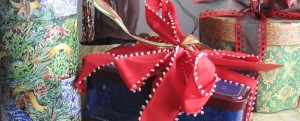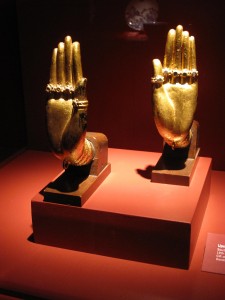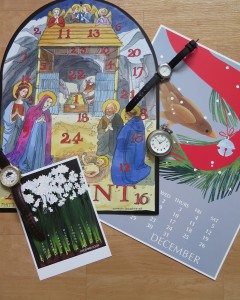 This is the time of year when thoughts turn to gifts: giving and receiving. Most of us in the parts of the world where Christianity and/or Judaism have a presence are busy thinking about what we can buy (or, less often, make) as gifts for a list that might range from only one or two others to a hundred or more. A few folks in those categories – including some of the old Amish and ultra Orthodox Jewish sects – have opted out of the madness, but remarkably few given that neither Christmas nor Hanukkah have any connection with gift-giving at all. For the Christian contingent, Epiphany can – by stretching the concept a lot – be argued as a gift-giving event…but not Christmas. Christmas is about welcoming the outcast and providing loving and sacrificial sanctuary to Divine Vulnerability.
This is the time of year when thoughts turn to gifts: giving and receiving. Most of us in the parts of the world where Christianity and/or Judaism have a presence are busy thinking about what we can buy (or, less often, make) as gifts for a list that might range from only one or two others to a hundred or more. A few folks in those categories – including some of the old Amish and ultra Orthodox Jewish sects – have opted out of the madness, but remarkably few given that neither Christmas nor Hanukkah have any connection with gift-giving at all. For the Christian contingent, Epiphany can – by stretching the concept a lot – be argued as a gift-giving event…but not Christmas. Christmas is about welcoming the outcast and providing loving and sacrificial sanctuary to Divine Vulnerability.
But worldly culture has saturated the airwaves and the visual field with holiday songs (I hesitate to say ‘carols’ since very few of them would qualify) and bows and ribbons and fancy boxes and innumerable unnecessary objects for us to resist or to give in to. This is actually a constant 24/7/365 PR blitz that only becomes more intense around certain seasons.
And let me say right up front that I am no more immune to this than the vast majority of us are. I write about it not because I have it solved and can serve as a stellar example of non-materialism, but because I desperately need to keep evolving in that direction…both for my own sake, for the sake of future generations, and for the sake of the environment. I will say that the process of ‘tidying up’ has helped enormously. [See (in order): Tidying Up, To Have or Not to Have, Labor(ing) Days, Role-ing Along, and Back to Tidying.] Having passed on, recycled, and discarded a substantial amount of stuff, my husband and I think much longer and much harder about acquiring anything else.
 What I know, however, is that my gift-desiring as well as my gift-giving are tainted by the brain-washing of a consumer culture. I believe I need things I do not need (or, even, want) and I believe I need to give things in order for others to believe I love them. Wrong on both counts. Hold that thought.
What I know, however, is that my gift-desiring as well as my gift-giving are tainted by the brain-washing of a consumer culture. I believe I need things I do not need (or, even, want) and I believe I need to give things in order for others to believe I love them. Wrong on both counts. Hold that thought.
When we need a reality check, it can sometimes be helpful to turn to story. So I would like to recommend the book The Doubt Factory by Paolo Bacigalupi – which is a novel found in some libraries in the young adult section because its main characters are young adults – that talks about how we are manipulated by advertising and the misappropriation of science into believing things we know to be false. It doesn’t directly address acquisition, but it reflects on the environment in which acquisition can become toxic.
I am also alerted to a book I will request from the library (since going through our books and papers in the tidying process, I have become even more inter-connected to my local library system), Phishing for Phools: The Economics of Manipulation and Deception. It is by Robert Schiller and George Akerlof, both Nobel Laureates in Economics. I expect to be depressed and inspired in equal measure. Most of us are familiar with the idea of phishing as a way of defrauding people through the internet. Schiller and Akerlof expand that theory to include any manipulation that works to the benefit of the phisher and the detriment of the phished (or ‘phool’)…which covers about 99.44% of all advertising and close to the same percentage of free-market economy as a whole.
Back to our own desire to acquire for ourselves or for others. I think we are tilted in this direction to the extent that we are insecure about our own ‘enoughness’. The market encourages us to believe that we are not enough and that we will never be enough. We continue to need ‘stuff’ (the right stuff, of course, which changes every quarter so we can never keep up) in order to be attractive, interesting, successful, healthy, and powerful.
G-d tells us something quite other. G-d (whether we experience her/them/him as our own highest nature, the greaterness that resides in our heart and soul, the strength of community ideals, or the generosity of the universe) tells us that we are incarnations of that divinity, right here, right now. We are good enough. We were always good enough and we will always be good enough. We do not need to put others down in order to be ‘up’. We do not need to force others to lose in order to ‘win’. And we do not need to rely on something outside ourselves to be worthy.
Let me put it more directly: The greatest gift we have to give is our Self. Our attentive and loving presence. Our authentic being with its blessings and its full humanity.
As risky as it may feel to resist the cultural tradition, it is only by trusting that we (you and I and each of our neighbors) are valuable and worthy, that we can give that unique and priceless gift with unmeasured generosity. And in giving it ourselves, we give others permission to do the same.
SO: I am asking for your support as I take an Advent semi-break from the frequency of my posts. In this time that is very demanding for clergy, I would like to be more present to my clergy spouse. I would like to give him more of my time and attention as he extends his time and attention to those with whom he serves in the community. During Advent and the 12 Days of Christmas, I will be posting only once a week…sometimes on Wednesdays when I am feeling more spiritually reflective, sometimes on Saturdays or Sundays when I am musing about something more general. It may happen that some weeks have two posts, but I am only committing to one.
 I invite you to join me in giving the gift of time and focused attention to someone you love or to someone you know needs it. I invite you to give yourself – it is the most valuable blessing you have to give.
I invite you to join me in giving the gift of time and focused attention to someone you love or to someone you know needs it. I invite you to give yourself – it is the most valuable blessing you have to give.
And may your Advent (or December or run-up to Hanukkah or Kwanzaa or Eid-al-Adha or Solstice) be deep and rich this year.
–Andrea
Text © 2015, Andrea La Sonde Anastos
Photos © 2015, 2009, Immram Chara, LLC
NOTE: A reminder that I have three sets of holiday greeting cards at my Etsy shop: one that is six different angels, one that is six different Madonnas, and one that is six different bonsai. Any set can be custom ordered to include six cards of a single design, if you prefer. The cards are hand-made and make lovely small gifts, as well, since they fit most 5″ x 7″ box frames.